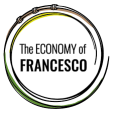AMAZONIA: NEW WAYS FOR THE CHURCH AND FOR A HOLISTIC ECOLOGY
AMAZONIA: NEW WAYS FOR THE CHURCH AND FOR A HOLISTIC ECOLOGY
FINAL DOCUMENT
SPECIAL ASSEMBLY FOR THE PAN-AMAZONIAN REGION
final-document-of-the-amazon-synod.pdf
PDF-Dokument [1'009.7 KB]
FINAL DOCUMENT
SPECIAL ASSEMBLY FOR THE PAN-AMAZONIAN REGION
final-document-of-the-amazon-synod.pdf
PDF-Dokument [1'009.7 KB]
The defence of the Amazon’s and its people’s life requires a profound personal, social and structural conversion. The Church is included in this call
to unlearn, learn and relearn, in order to overcome any tendency toward colonizing models that have caused harm in the past.
In this vein, it is important for us to be aware of the power of neo-colonialism which is present in our daily decisions and the predominant model of
development that is expressed in the increasing
use of monocrop agriculture, our forms of transportation and the illusions of well-being based on the pervasive consumerism that our society enjoys
and that has direct and indirect implications in the Amazon. Faced with this and taking a global point of view, and also listening to the voices of our sister churches, we want to embrace a
spirituality of integral ecology, in order to promote the care of creation. To achieve this, we must be a much more participatory and inclusive community
of missionary disciples.
We propose to define ecological sin as an action or omission against God, against one's neighbour, the community and the environment. It is sin
against future generations, and it is committed in acts and habits of pollution and destruction of the harmony of the environment. These
are transgressions against the principles of interdependence, and they destroy networks of solidarity among creatures (cf. Catechism of the Catholic
Church, 340-344) and violate the virtue of justice.
We also propose to create special ministries for the care of our common home and the promotion of integral ecology at the parish level and in each
Church jurisdiction. Their functions include, among
others, the care of the territory and of the waters, as well as the promotion of the encyclical Laudato si', taking up the pastoral, educational and
advocacy program in its Chapters V and VI at all levels and structures of the Church.








